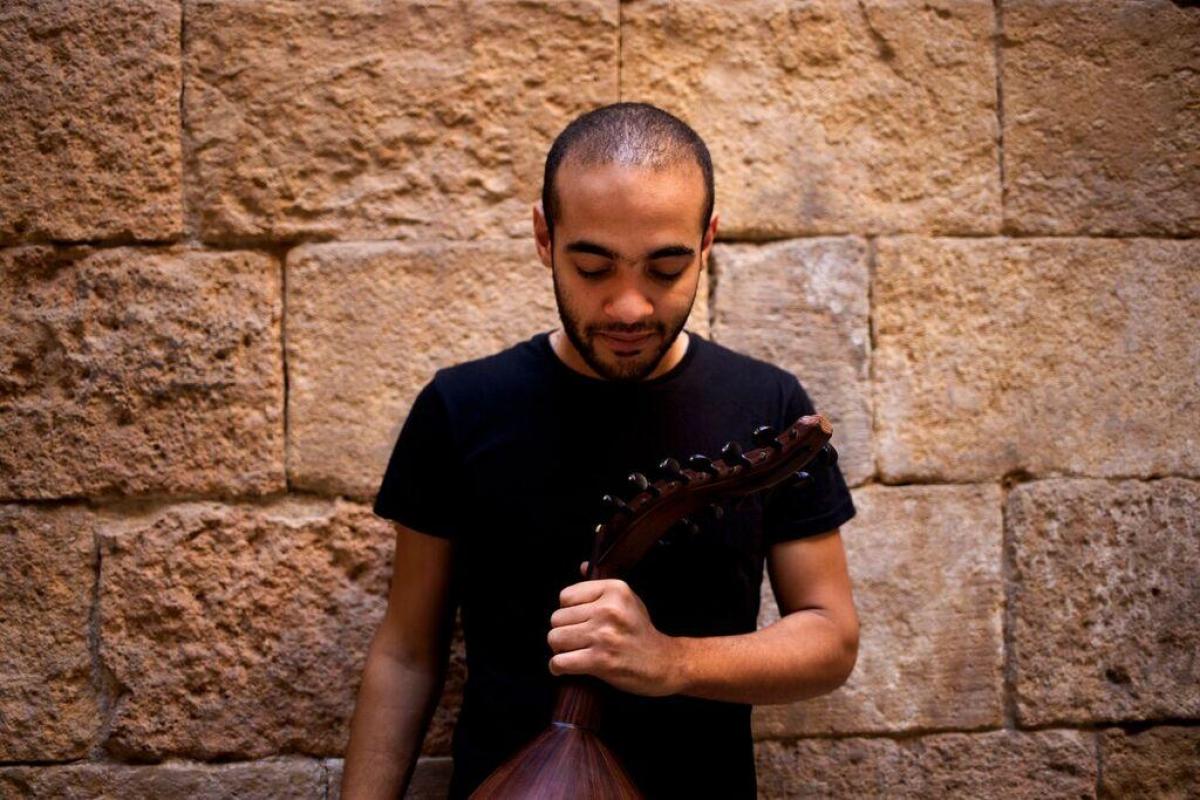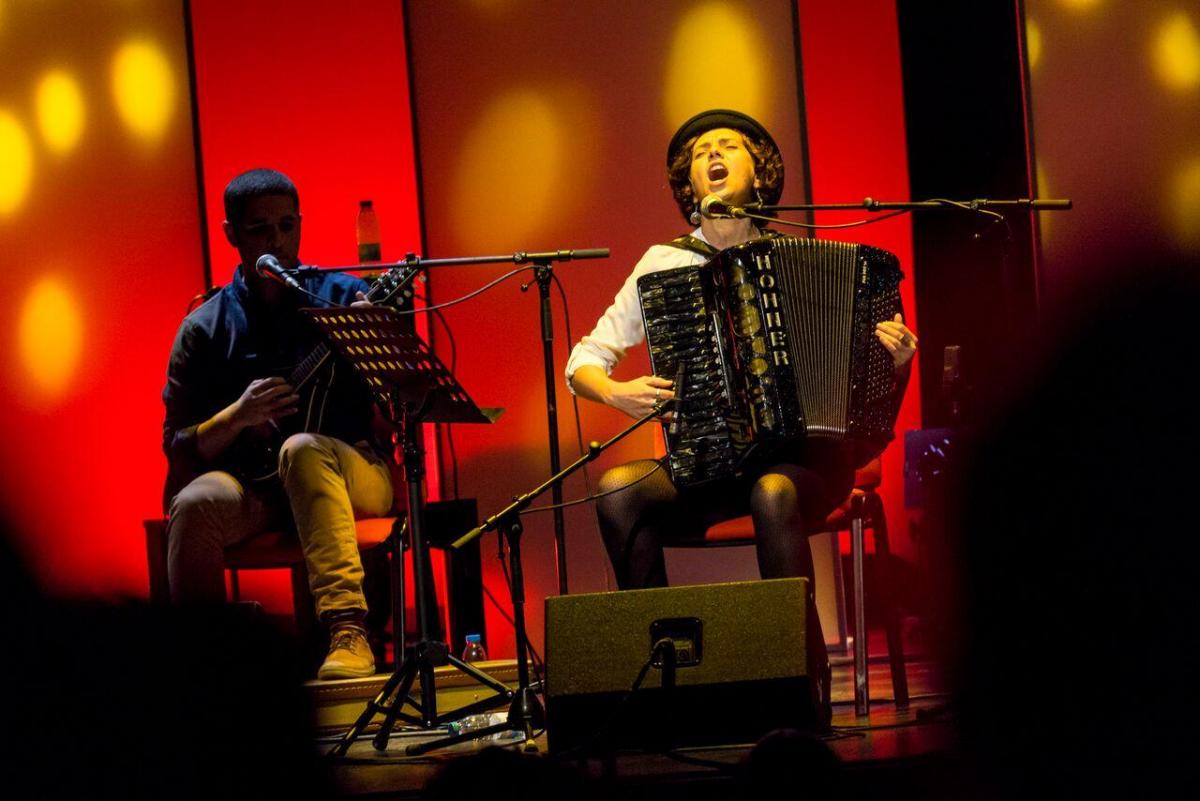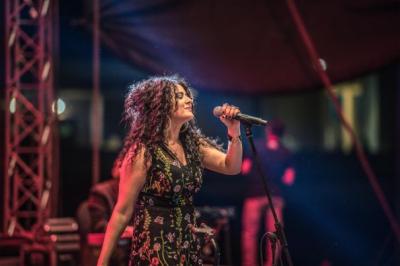
How to Escape Exotism
For musicians living and performing abroad, it can be a challenge to avoid being exoticised and framed in an aesthetic prison. The Egyptian musician Mohamed Abozekry has reconciled the traditional and the avant-garde in his music.
Mohamed Abozekry’s third album, Karkade, is a collection of modernized «tarab» and «tahkt» driven tracks that offers a contemporized take on traditional Arabic music. It recalls classical Arabic music, Sufi music from Upper Egypt, and folk music popular along the Nile River. Composed entirely by Abozekry, the album is a lush collage of inventive interventions, while remaining rooted in the traditional codes of the musical forms he inhabits.
The music draws from the 1920s-1950s – Egypt’s musical golden age – both in timber, and structural codes, but also through the highly present spirit of improvisation at the crux of Karkade’s live performance. This is perhaps why the experience of watching Karkade live makes one feel temporally displaced, or quite possibly unstuck from time. This is partly due to the old styles of music, but also the juxtaposition of the old being played masterfully by young performers. In the Center Stage tour, we hear this in the performances of Mohamed Arafa on deholla (the bassier cousin of the tablah), Lotfy Abaza on violin, and their playful interventions, but also through Abozekry’s unique use of the oud. He furthermore adds contemporary jazz elements, through which he often transforms the oud into a bass instrument by means of a «slapping technique». There are, however, some caveats regarding the music of Karkade, according to Abozekry. «It’s a completely out of fashion, and possibly a little exotic, too», he says.
Questioning Cultural Roots
While skillfully mining the exotic has proved to benefit Abozekry, allowing him to produce a prolific body of work, he does not see this as his own personal pathway for artistic development. Instead, he is looking for more meaningful interactions with his root culture. Abozekry is one of many Arab artists based in France. On the tour, our discussions become an exploration of his own music, and that of his peers, to see how they perform their personal synthesis of East and West. At the age of 11, Abozekry began touring with the Iraqi oud virtuoso Naseem Shamma of Beit El Oud, and by 18 he was off to France for university. In his time abroad, he has released multiple albums, including Chaos and Ring Road with his jazz-fusion band, HeeJaz, and more recently, Don’t Replace Me by a Machine with the Trio Abozekry.
After nearly a decade of living and working abroad, however, Abozekry is homesick for Egypt. But this is more than mere sentiment. For him, moving back to Egypt is pivotal for the development of his career and escaping the exotic typecaste into which he is placed by continuing to exclusively travel through the «world music» industry. While this genre does give platform and industry to a pantheon of international musicians, there is something innately exotic at the root of its labeling - one that reinforces the colonial construction by grouping numerous music traditions into a group that might as well be labeled «the others».
«It’s great being able to live for a while in such a very professional and competitive atmosphere as a freelancer artist. But once you make your name, you end up being a representative of your people, your color rather than being exposed for your art. What I want to say is that you get classified whether you like it or not as someone who’s sort of an ambassador, which is not always a bad thing. But the bad thing is that everyone is put in the same cart. And you become an exotic icon even if what you propose artistically might be not coming from your natal culture at all». He cites Ibrahim Maalouf as an example, albeit a musician he respects.
Between Local Tradition and Global Avant-garde
Maalouf is a trumpet player, composer, and arranger, born in Beirut to Lebanese parents. He fled to Paris during the Lebanese Civil War and he has become a widely-known Arab musician performing in Europe. In his bookings, there is usually a reference to his Lebanese culture, despite the fact that his music is almost entirely rooted in Western aesthetics. We hear this even in his songs that reference Arabic music, such as in his album Kalthouhm.
Kamilya Jubran on the other hand, takes a different approach to cultural synthesis. The Palestinian oudist, singer, composer, arranger, and teacher continues to find influential ways to navigate the exotic while living in France. Regardless of the restrictions placed on Kamilya’s mobility throughout the Arab world, due to being born Palestinian within the Israeli settlement of Akka, Kamilya continues to contribute to the development of contemporary Arabic music. In the past two decades she has instructed a range of Arab musicians from Abozekry to Tamer Abu Ghazaleh, Dina El Wedidi, Abdullah Miniawy, Maryam Saleh, Nadah El Shazly, and many more.
Musically, Kamilya’s work is often situated within the niche corners of the global avant-garde, where it draws from traditional Arabic music references, alongside jazz and experimental electronic-acoustic compositions. While creating highly contemporary music, as heard in her work with Werner Hasler and Sarah Murcia, Kamilya draws upon her traditional culture through the timbral quality of her oud and voice, so as to anchor her listeners to an Arabic context, while still pushing the boundaries of what it means to be progressive.Each of these artists offers a window into the plight of Arab musicians who live in the West. For some it is a choice, for others it is a result of political restrictions, war, or exile. Thus the question at hand is less about why an artist lives abroad, but rather, how they manage to synthesize their different cultures in order to break free of exoticism, grow, and ultimately remain relevant in a global music landscape.
In October 2018, Egyptian music journalist Maha ElNabawi was sent by the American Embassy in Cairo to the Center Stage tour through multiple US cities to cover performances by Egyptian musicians Youssra El Hawary, Dina El Wedidi, Mohamed Abozekry, and their respective bands. The gigs journeyed through the east and west coasts, including panel discussions, a street concert in the micro-town of Lyons, Nebraska, with a population of 800, to Washington, DC's Kennedy Center, to the Globalquerque World Music festival in New Mexico, and an immaculate, gothic cathedral in West Harlem, New York, among other locations. The Center Stage program, funded by the US State Department, produced by the New England Foundation for the Arts and Lisa Booth Management, is now in it's 4th year.
Biography
Published on November 13, 2018
Last updated on April 09, 2019
Topics
From Self-Orientalism in Arab music to the sheer exploitation of Brazilian funk music by acclaimed artists: how exotica examine aesthetics playing with the other and cultural misunderstandings.
From westernized hip hop in Bhutan to the instrumentalization of «lusofonia» by Portuguese cultural politics.




